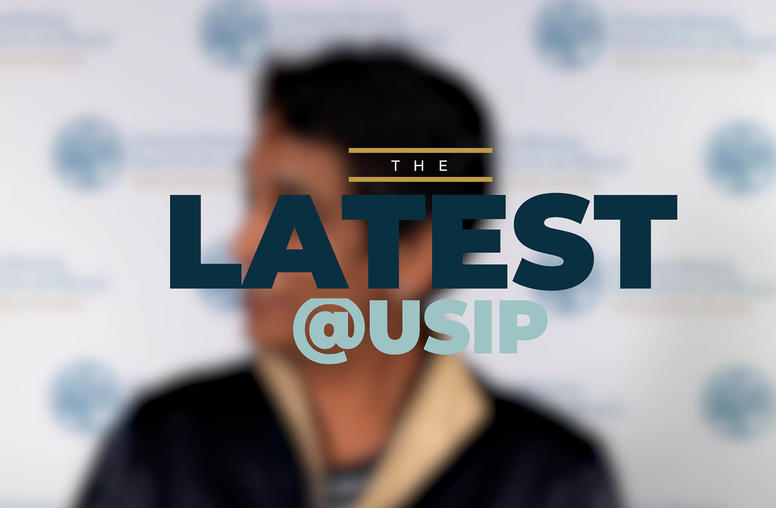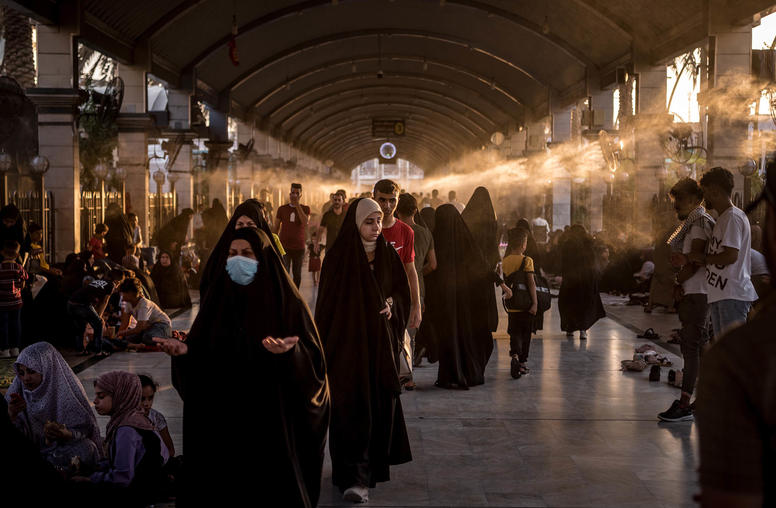Event Extra: Rethinking War Amid the Dire Global Food Crisis
Russia’s war in Ukraine has deepened a global food crisis that has left hundreds of millions facing acute hunger. Beyond the humanitarian challenges this crisis presents, it could stoke violence and conflict in fragile regions. U.N. World Food Program Chief Economist Arif Husain discusses the state of global hunger, why it’s vital that we rethink our response to conflict and what can be done in the immediate to stave off the worst.
The Event Extra podcast offers one-on-one interviews with some of the policymakers, practitioners and leaders who spoke at U.S. Institute of Peace events. Each episode highlights their ideas on areas of conflict and how to achieve peace.
Transcript
Adam Gallagher: I'm Adam Gallagher, managing editor for usip.org and host of USIP Event Extra, where we talk with policymakers, practitioners and leaders after USIP events to get more insights on pressing peace and security issues. Today we'll be discussing the dire global food crisis, exacerbated by Russia's war on Ukraine. Joining us today is Dr. Arif Husain, the chief economist for the U.N.'s World Food Program and a former agro-economist at the World Bank.
Arif Husain: Thanks, Adam. I'm happy to be here.
Adam Gallagher: Arif, it seems that the international community is finally starting to realize how dire this global food crisis is and grapple with it. But it's not like it was a rosy picture before Russia's invasion. Can you lay out for us where things stood prior to the war and where we're at now when it comes to global hunger and food related challenges?
Arif Husain: A few years ago, the number of acutely hungry people was about 80 million. Before COVID, meaning in 2019, it was about 135 million. Biggest reason behind that: war. During COVID. That number rose up to 276 million. And today, that number is 345 million. Now, when I say acute hunger, what I mean is people who are in crisis level of hunger. Of this 345 million people, there are about 50 million people who are in what we call hunger emergencies, meaning one step away from famine. In fact, there are about 850 plus million people already who are in catastrophe or famine, as we speak. The other scary part of all of this is that these 50 million people I'm talking about, they're not concentrated in one or two or five, or 10 countries, they are in 45 countries. This is the magnitude of global food insecurity, I will say, which drives insecurity around the world.
Adam Gallagher: So at today's USIP event, the focus was really on the relationship between hunger and conflict. And you started to touch on it a bit at the end of your last answer, but I'm wondering if you could just explain a little bit more how the two are connected and how they can drive one another.
Arif Husain: Look, you know, people mix up words, a lot of those, conflict, civil unrest, you know, destabilization, they're all in the same, same in my head, at least they're all in the same category, if you will. It's just the intensity, right? So it's very easy to see that when there is conflict, food insecurity rises. Why? Because people get displaced or you know, if there is war, you cannot have your agriculture or you can have you know, people burn people's crops, all of that. Right. And that's clear and very straightforward. But you know, what has little less research, not little research, less research is the other one, meaning hunger drives conflict, or civil unrest, or destabilization. So, look back at 2008, we say, riots in 48 countries. Isn't that a form of conflict? It's not that, you know, maybe we end up saying, oh, we don't have enough evidence. Well, we don't have enough evidence of people going to war because there was food insecurity. But we have evidence of the governments toppling, unrest, destabilization, people crossing borders, because they didn't have enough to eat. So I think this is what we need to make sure that people understand that, you know, a hungry man is an angry man, somebody very smart said that, because it's true. The second thing is, essentially rethink war. What is different, let's say from from 50 years ago, or, or 30 years ago? Is that, like it or not, our our world is really, really, really connected. So when something happens in one place, you're not immune to the consequences of that. I mean, Ukraine is a classic example. I mean, there's a country of 40 million people fighting the largest country on the planet in size. Why can we just say, oh, it's somebody else's problem. We can't. Right? Not from the moral standpoint, not from the political standpoint, not from the economic standpoint. And the repercussions of that are not only for Ukraine, they are being felt all over the world. We need to see, war as not over there, somebody else's problem. We need to start seeing that it's something which has real consequences for us. And that is different than it was 50 years ago.
Adam Gallagher: I think that's such an important point that no matter how you slice this, if you want to look at it from a humanitarian imperative, from a political economy perspective, or just from a sheer dollars and cents perspective, that we need to think about how interconnected these challenges are, and address them right at the roots. I think that's such an important point.
Arif Husain: Absolutely. And frankly, I mean, you know, if you believe, you know, we crunch all these numbers, and if we believe in these numbers, and you say, what 70 percent of the root cause of all the misery that we see around the world is conflict, we better do something about it. And that's not what World Food Program is going to sort out. We address the symptom of that. But till the root cause goes away, people say, oh, you know, the aid bill is going up and up and up, what's going on? I mean, you know, we need to bring this down. Yeah, we need to bring this down, please calm a few of these conflicts, and you will bring their bill down. But till then, don't tell me why if you were suffering yesterday, because of that war, and that war is still continuing, why should your outcome be any different?
Adam Gallagher: You know, you're on the frontlines of this challenge at WFP, as you just alluded to, so, you know, what are your top level recommendations for how to address this crisis today, and moving forward in the months and you know, immediate years ahead?
Arif Husain: Realize, recognize that people are truly squeezed. There's no wiggle room in a way. So we need to make sure that we provide them with the assistance that is necessary to save their lives. So that means the form, first and foremost thing. The second thing is that we need to enable the governments to have enough resources to buy what they need to buy, like food, like fuel, like fertilizer, and we need to create those facilities in the IFIs, international financial institutions, and others for them to actually do that. The third thing to me is, particularly in the near term, if we can open those ports in the Black Sea, that would help a lot. That has to be at the commercial scale, for food, for fuel, for fertilizer, and suddenly, you may start to see prices, not going back to the you know, two year level, but at least not going up or coming down. I think that's that's critically important. Making sure the fertilizer is where it's needed, agricultural inputs are where they're needed, whether in small quantities or big quantities, you know, concentrated or not concentrated. I think that is probably the biggest problem we are looking at right now, other than saving lives of people. That to me are some of the things which you may want to do in the near term. Also, I will go saying like, look, I mean, governments, particularly U.S. incredible leadership, putting $5 billion in the Ukraine package for global food security, followed by countries like Germany, putting a whole lot, you know, about $4 billion, UK $1 billion plus change in global food security. You know, G7 just finished meeting in Germany, putting four and a half billion dollars more. That's extremely positive, encouraging. We just need to get that money out now. So it's flowing. But also it's, you know, I think the Gulf needs to do the same, especially the oil-producing countries, whoever won a windfall this moment, maybe they need to take care of that region, which then frees up resources for the rest of the world. And that will be great. That would be really, really good. And I think, you know, that's something which should be looked at. If you're going to sort this out, it's not going to happen in months. It's going to take time, it's going to take a few years, which means that decisionmakers, policymakers need to stay focused, even when this crisis subsides.
Adam Gallagher: I think, I mean that it all circles back to your essential point there about about rethinking war and how we respond to it in a way. Arif, I want to thank you so much for your time. It's very much appreciated. For more on the global implications of Russia's war on Ukraine and the hunger crisis, visit usip.org.
Watch the original event Preventing Conflict Amid the Global Food Crisis.



